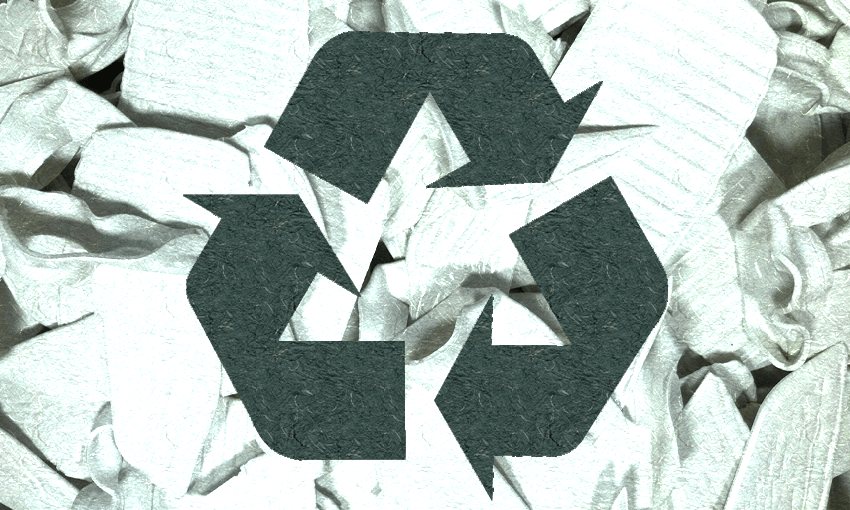To take pressure off New Zealand’s swamped recycling system, Ecostore is taking on the responsibility themselves. Russell Brown reports on the brand’s attempt to lead the way.
Shopping dates. We all do them, right? Nights out are all very well, but sometimes it’s good to go out in the daylight together and do the errands. Sometimes it just makes practical sense – and since my partner and I both have e-bikes, it’s also a lot of fun.
So periodically, we’ll get on our bikes and do a refill run. It’s one reason we like Ecostore products – we don’t have to throw the bottles away. Whether it’s the shampoo or the dish-washing liquid, they’re refillable at a couple of places locally. We head in, top up, pay a little less than we would at the supermarket and ride off down the hill, madly virtue-signalling as we go.
Most brands don’t let you do that. So, like all good urban liberals, we put out other empties in the recycling bin and try to ignore the voices in our heads that say that ordinary plastic recycling might be a bit bullshit. And yet, it’s the only choice for people who don’t happen to live near a refillery.
That’s the gap that Ecostore aims to bridge with its new Permanent Bottle Recall programme, the latest phase in the company’s journey into circular systems. Five years ago, it reinvented the plastic used in its containers, which are now made of a blend of recycled material and sugar plastic derived from sustainably grown sugar cane. Because the sugar plastic is derived from a plant, it pulls carbon out of the atmosphere as it grows, rather than releasing it in the form of petrochemicals. Now Ecostore is starting to address the plastic waste problem through a new return programme.
At more than 100 locations around the country, Ecostore customers will be able to drop their empties, which will go directly back to the company to be ground down and remade into new Ecostore containers.
It is, says Ecostore group marketing director Jemma Whiten, a very different process to conventional plastics recycling.
“An average New Zealand household goes through nearly 950 plastic bottles and containers a year,” she says. “That’s 1.8 billion across the country, each year. Of that, unfortunately 39% goes straight to landfill. That’s because people don’t quite know where to put it, what kind of plastic it is.”
Where the remainder goes isn’t actually clear.
“No one knows. Consumers don’t know, businesses don’t know – and the government also isn’t able to get access to the information as it’s held by private companies. It’s one of the big gaps in the Rethinking Plastics in Aotearoa New Zealand report that was presented to Jacinda Ardern last year,” says Whiten.
“We do know the majority of it is sent overseas because we just don’t have the capability to fully process and recycle it here in NZ. As soon as it goes overseas, we don’t know where it’s going.”
She ticks off the stages in the new Permanent Bottle Recall cycle:
“Consumers need to be able to get their bottles back to us. So once they drop them off at one of the bottle-drop locations across the country, the specialty stores and the schools [more on that below], we use the New Zealand postal system to get those back to us.
“New Zealand Post are masters in logistics, so it makes sense to work with someone who does that so well. They also have a real drive behind the sustainability of their business, their fleet, and how they operate. That’s very important to us.
“We then work with Astron Plastics in Auckland’s East Tamaki, who grind the plastic down for us. From there, it goes to our longstanding partner Forward Plastics in Pakuranga, who remould the bottles for us. We fill them as we normally would – and they’re back out again.”
The recall initiative, a year in the making, meant forging new relationships, notably with EnviroSchools, a nationwide programme that delivers a practical sustainability framework into schools around the country, and Auckland Council. Initial assistance to get the project off the ground came from the Ministry for the Environment’s Waste Minimisation Fund. The new partners took no convincing, says Whiten.
“We actually went to Auckland Council and discussed our vision to set up a circular system, but we needed to work out how we get our bottles back. So we started discussions with them and they said, well, we’ve got this whole EnviroSchools programme happening around New Zealand – and there are all these schools that want to do something.
“We did a co-design workshop with EnviroSchools and teachers and students from kindergarten, primary and high schools. We asked them, what would a circular system look like? It was so inspiring – the kids are amazing, They see the need to address the problem and they get excited about their ability to take action to address it. Off the back of that workshop, teachers came to us and said, ‘OK, when are we doing this?'”
Part of the project was the creation of educational resources, including case studies and suggestions for sustainable systems. That, says Whiten, has been a delight.
“The schools have been doing art projects – creating these paper bags that they’re going to collect Ecostore bottles with. They’re creating science projects off the back of it. They’re creating maths projects where they’re counting how many bottles they’re getting and what that means in terms of the plastic they’re collecting. Children learn through doing – this is their opportunity to understand circular systems and their benefits.”
The enthusiasm of schools for a solution to the plastics problem doesn’t come from nowhere – it’s reflected in the community. The most recent report from Colmar Brunton’s Better Futures project found 69% of New Zealanders were “highly concerned” about the build-up of plastics in the environment – as an issue it ranked second only to the welfare of young people, and ahead of the cost of living, violence in society and access to healthcare.
“The other stat that’s very important out of that report is 70% of people saying they also believe that businesses need to start taking responsibility,” says Whiten. “Ecostore has the ability, we have the desire to lead that change. We have the opportunity to do so. So let’s stop the talk, take some action and do it. We have to help give consumers the ways in which they can do that little bit of good.”
Dr Rachel Chiaroni-Clarke, senior research and policy analyst in the office of the prime minister’s chief science adviser, and co-author of the Rethinking Plastics report, says broader change relies on companies like Ecostore setting an example for others to follow.
“Our catch cry from the whole year of research we did last year on plastics was ‘make best practice standard practice’,” says Chiaroni-Clarke. “We were pretty amazed that there were already all these individuals or businesses who had improved their systems and were doing good things.
“This is one of those examples, where Ecostore is demonstrating product stewardship and they’re going to have really high-quality recycling because they’re just taking their own plastic back. It means that plastic will be able to stay in circulation for longer and longer. It’s a good sign for other businesses to try and follow suit.”
That in turn relies on both motivated individuals within companies and culture that supports them, she says.
“I know that Ecostore also did some work getting their whole team together to understand more about the circular economy, workshop ideas around it and ingrain that culture into the whole team. It’s about keeping that material in circulation rather than ‘take, make, waste’, which is our default setting, unfortunately.”
Whiten acknowledges that her close involvement in Ecostore’s development of circular systems makes hers not the average marketing job. But, she says, that’s why she joined the company.
“I’m a marketer at heart, but I want to be driving sustainability. Business and government can do a whole lot of things, but the only way we’re going to drive change is if consumers change with us. Marketers help to drive the much-needed change in consumer behaviour.”
Before she joined Ecostore, she worked for nine years at Unilever, during the time that CEO Paul Polman reoriented the global giant towards a long-term plan to decouple its business growth from its overall environmental footprint. Polman stepped down last year to found a new organisation, Imagine, which aims to help other businesses work towards eradicating poverty and combatting climate change.
Whiten says that although Ecostore makes New Zealand’s best-selling soap bar (the lemongrass one, in case you were wondering), it’s still a relatively small fish in its industry.
“But the fact that we’re smaller means we’re nimble, we can work faster – so why don’t we create a solution and say, ‘here’s our system, this is how we’re doing it’? Most other businesses out there understand there’s a problem, but they don’t know what to do about it. Well, here’s an example.”
To that end, she’s determined that the hundred sites for the bottle recall represent a beginning, not an end, to the project. In particular, she would like to see other businesses join the programme.
“I’m inviting them to do so. Absolutely. The idea is that this becomes the collection process for HDPE [high-density polyethylene, which is what most of our plastic bottles are made from]. We would like to scale it as much as possible, so if there are any businesses out there who want a circular system for HDPE, come and chat.”
Apart from that, Whiten and her colleagues will focus on steering the 27-year-old Ecostore even further into sustainable solutions.
“The plastic problem is such a big one – and when you have such a big problem, there is no magic bullet. So that’s why it’s important to do a multitude of solutions. There is a source problem and there is a waste problem. In terms of the source problem, 98% of the plastic around the world is created from petrochemicals – oil pulled up out of the ground. It’s not sustainable, not renewable. And yet it lasts about 450 years.
“We also need to address the waste issue. And that’s where this new programme comes into play. The reality with plastics is that plastic in and of itself is not the problem. It is that we are not creating the systems to deal with a valuable resource.”
The company’s refill network continues to expand, with 75 stations nationwide, including some now in supermarkets. “Then after that, it’s redesigning our products so there is less reliance on plastics overall.” Consumers, she notes, are already steering back to cardboard-packaged hand soaps and away from plastic bottle hand-wash products.
This, says Chiaroni-Clarke, is the kind of diverse approach the New Zealand economy needs to embrace.
“It’s important to think beyond just recycling,” she says. “We can get stuck on recycling as the solution to the plastics problem. It’s one solution. We can also think about reuse and refilling systems – and Ecostore offers those as well. Ideally we’d use less plastic in the first place. But where we are using it, let’s make the most of that material and value it more highly than we do at the moment.”
Finally, echoing her former boss Polman, Whiten emphasises that there isn’t just an environmental imperative to all this, but a business reality.
“It makes absolute commercial sense to change what we do. There are billions of dollars being lost every year because we just throw stuff away.”

